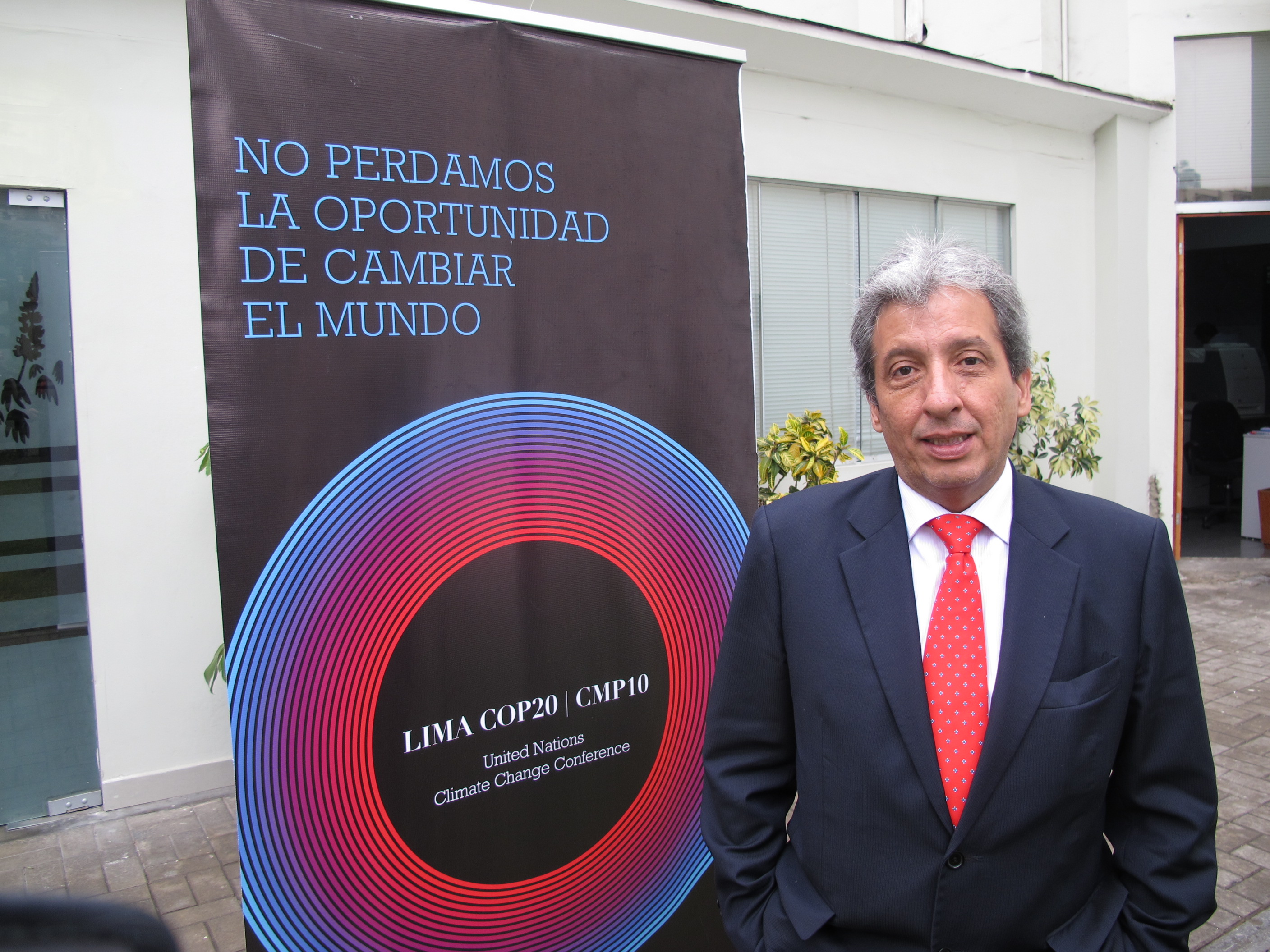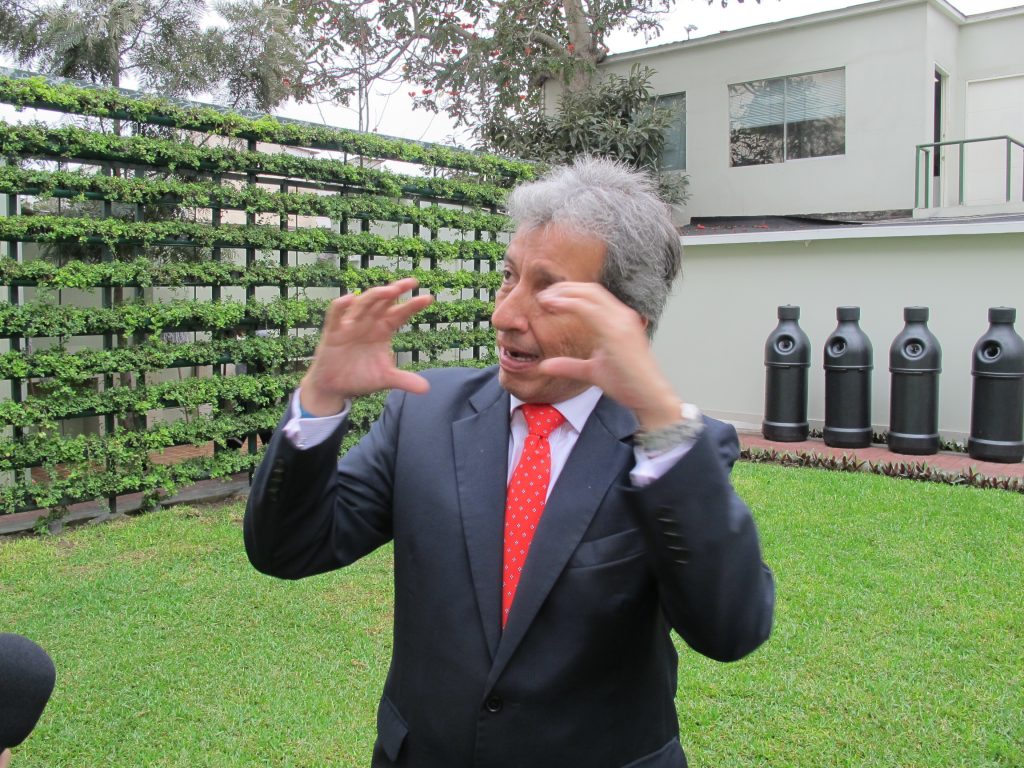por Giovanny Vera and Gustavo Faleiros
 Pulgar Vidal will be the president of COP 20, the UN Summit on Climate Change hosted in Lima. Foto: InfoAmazonia.org
Pulgar Vidal will be the president of COP 20, the UN Summit on Climate Change hosted in Lima. Foto: InfoAmazonia.org
Peru’s Minister of the Environment, Manuel Pulgar Vidal, interviewed by the InfoAmazonia.org team in Lima on the 8th, said that he hopes to sign an agreement about the REDD+ mechanism for reducing emissions during the 20th UN Conference on Climate Change, which will be hosted this year by Peru.
Pulgar Vidal affirmed that he hopes to attain the agreement while respecting the main worry of countries (like Bolivia and Ecuador) about safeguarding indigenous rights.
Complete Interview in Spanish
The minister also commented on one of the Peruvian Amazon’s principal problems: the illegal mining of gold in Madre de Dios. For Vidal, the only way to revert the process is to present economic alternatives por the thousands of migrants that arrive in the Amazon in search of riches.
“Peru’s strategy to combat illegal mining is smart. It will be difficult, I believe it will take us years to get to a complete solution, but we are going in the right direction. The idea of having a development plan is fundamental”, he explained.
For this reason, the minister mentioned as an example the state of Acre, which adopted the “forest on its feet economy”. More recently, the government of Acre presented a carbon credits plan that is considered a model to be followed by other regions.
See the principal parts of the interview below
In your opinion what is the significance of the recent contact we’ve seen from isolated indigenous peoples, who crossed Peru’s border with Acre? Does this represent some type of alert about the pressures they suffer in the Amazon?
This evidence in photographs and videos of indigenous peoples in voluntary isolation ends up increasing awareness in Peruvian society and Brazilian society that these peoples exist, that they determine their own way of life, that they depend on natural resources and inhabit the territory in the nomad way. We should protect their rights, because they have autonomy to decide how to live, and this decision must be respected. As for the recent displacements, I believe that not even anthropology has been able to come to a conclusion that explains it. It could be a question of illegal loggers or it could be pressure from illegal mining. Or even a pressure from the growing cities that create migratory cycles, or scarcity of resources. Could it be that we could call it a question of climate change in the norms of the Amazon?
I believe we shouldn’t attribute it to just one factor. I believe that sociology and anthropology will give us clues about why these migratory movements occur. On the other hand, what is clear is that, when solid conservation practices are created and resources are managed sustainably, these populations get closer to those places. The best example of this has been the presence of populations in voluntary isolation in the bay of Rio de los Amigos, where there is a concession for conservation in Peru. I believe that we can learn positive lessons from this: how a practice of conservation permits a better understanding and more respect for the rights that they deserve.”
At this moment, there are pressures on the Peruvian Amazon from illegal gold mining. How does the government’s policy address this pressure?
Throughout the Amazon, policies were elaborated on the basis of the myth that the Amazon is infinite, unoccupied and will help us get out of poverty, and many other myths which today we thankfully have started to disprove. In the past these myths helped create migratory processes, principally of very poor people, that left the Andes and sought an alternative in the Amazon. Besides that, there were very perverse processes, encouraged by the belief that the forest is not productive, but that a farm was a way to give the land productivity. The same idea exists in Brazil: the forest must be cut down to be productive.
In our countries there are areas that expel those that are poor, and other areas that are receivers, which many times don’t have the capacity or services to receive so many people. This leads to impacts like illegal mining in the Madre de Dios region. The receiving regions for decades have had standards of occupation that are very disorderly. Many people arrive there and do not find an economic alternative, and when they find out they can find gold on the riverbanks, , the only thing that does is stimulate illegal mining.
Although it may be criticized, Peru’s strategy of combating illegal mining is smart. It will be difficult, I believe it will take us years to get to a complete solution, but we are on the right track. In the case of Madre de Dios, the idea of a development plan is fundamental. It was announced by President Ollanta Humala [Ollanta Humala]. It would be interesting to hear more from people in Acre about all of their sustainable development and carbon strategy, and also other people in Brazil so that they can tell us how they are trying to revert that type of process.
Other pressure come from the incentive to invest in oil exploration activities. Is it possible to contain pressures on the Amazon from this sector?
In the case of oil, there were distinct moments of advantage for this resource. Oil exploration in the Amazon dates back to the 70s. There are some bad experiences principally because there is no regulation. But there are also other interesting experiences, some even highlighted by The Economist magazine, like Camisea [gas exploration project], where there was almost no construction of infrastructure. It was an island that didn’t cause migratory processes. However what I think we need to do is to establish all of the standards. I am referring to the environmental and social rules that permit the reconciling of the fragility of the amazon ecosystem with taking advantage of hydrocarbons. We don’t believe these activities should be totally banned, but we have to make a transition to a more orderly system.
How will Peru position itself on the theme of fossil fuels during COP20?
We have to remember that COP is a negotiating space where probably we won’t discuss the oil theme. What we will discuss is the relevance of the Amazon ecosystem, and the relevance that its environmental services have. Or even the importance of mainting the forrest on its feet and why that means an alternative to the threats of deforestation. Happily, href=”http://en.wikipedia.org/wiki/Reducing_emissions_from_deforestation_and_forest_degradation” target=”_blank”>REDD+ [mechanism for reducing emissions] advanced greatly in Varsovia (COP 19), but we still need to advance with all our energy. I hope that in Lima we advance more with this and that we will have a consolidated REDD+ ready for Paris [ where COP21 will be realized]. But we recognize one thing: the carbon markets for forests are still not mature enough to attribute a significant value. The value of a ton of carbon connected to the forest cannot be so low, because the level of investment and the cost of maintenance is probably higher than what is received. And when you fight against an activity like illegal mining, sustained by the price of gold – 1200 dollars an ounce verses 5 or 6 dollars per ton of carbon, you can immediately understand the challenge.
In South America we have very diverse visions among the countries about REDD. Bolivia announced that it doesn’t adhere to these mechanisms. Brazil supports it if the market is not moved by credits or compensations. How can we align our diplomacy?
Definitely the climate debate generated a change in the way the world is organized. For example, the old tradition of Andean countries walking hand in hand is not necessarily what is seen in the climate change debate. Bolivia and Equador form a group, while Peru and Colombia are part of another group. The isn’t the way they organized themselves economically in the past. Even so, I believe that we should find common ground. If we know that, in the case of Bolivia, the preoccupation with REDD is the safeguards for indigenous peoples, I believe that it is a theme we should advance upon. Hosting the COP in Latin America means finding meeting points. For Brazil, the main worry is maintaining the principal of common, although differentiated, responsibilities. But we know that there is a consensus that this system remains current, even among the developed countries. The biggest doubt is if we will be able to resolve these problems. For me, as the president of the COP, lies the responsibility to be neutral and try to go beyond the differences.


